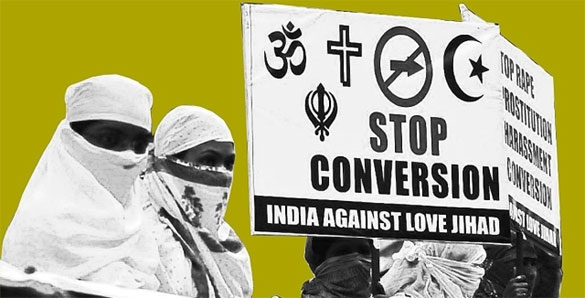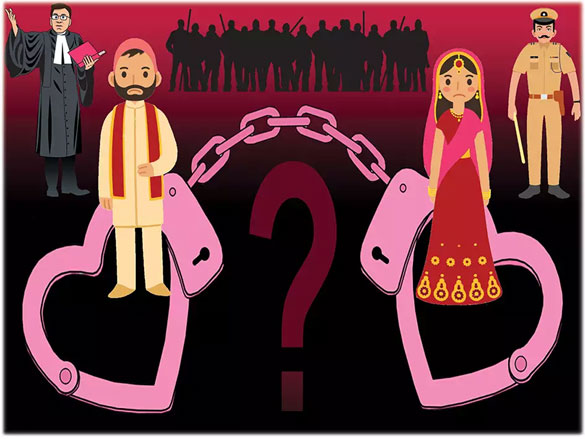What Is New In The ‘New’ Anti-Conversion Laws, Popularly Known As Anti-Love Jihad Laws?

By
Arshad Alam, New Age Islam
31 December
2020
With Madhya
Pradesh and Uttar Pradesh enacting laws to prohibit religious conversions
through force, fraud or allurement, there is a lot of opposition from those
proclaiming themselves to be ‘secular’. Such pious protestations ring hollow
when we realise that similar laws have been on our statutes all along and for
decades, these so-called secular and progressive forces have been silent about
it. In arguing this, I am not supporting the recent laws which have been
enacted; clearly they are deigned to target a particular religious minority,
namely Muslims. All that I am saying is that opposition to such laws should be
consistent, irrespective of which government is in power. After all, what this
government has done is to simply build upon the existing laws. Forgetting this
genealogy is akin to forgetting the complicity of the so-called progressive
forces and parties in bringing us to where we are as a nation.

The first
thing to realise is that such laws have been enacted not just by MP and UP but,
at different times, also by Himachal Pradesh, Uttarakhand, Jharkhand, Arunachal
Pradesh, Chhattisgarh, Gujarat, Odisha, Rajasthan and Tamil Nadu. In some
states (like Tamil Nadu), the law was repealed, while in others (like Himachal
Pradesh), it was struck down by the high court. One must not forget that
Himachal Pradesh had a Congress government in 2006 when the law was given
shape, even though some of its provisions were later struck down by the high
court. So although, legally, the government was not successful in implementing
the law, it definitely showed its political intent to do so at that time. It
was this law which was later reworked into a more stringent bill (supported by the
Congress party in the state assembly) by the BJP government in 2019. Let us
also not forget that one of the earliest such laws was enacted in 1968 in
Congress-ruled MP. The current BJP government has built upon that same edifice.
------------------------------------------------------------------------------------
------------------------------------------------------------------------------------
One of the
most problematic aspects of these recent laws is that the burden of proving
oneself innocent rests on the accused. This turns the criminal justice system
on its head where normally the burden of proof lies on the person who is making
the accusation. We saw this when the UAPA was amended in 2019. Under it, all
that the state has to do is to accuse someone of terrorism. It is then
incumbent on the accused to absolve herself of such a charge in the court of
law. But let us also not forget that this provision was first introduced in the
anti-sexual harassment laws enacted during the Congress government, where the
burden of proof still lies on the accused and not on those who are making the
accusation. It is rather rich of the ‘progressive and secular’ forces now to
turn around and criticise these laws when they campaigned for including the
same provisions not very long ago.

Hindu
nationalists have always argued that they are losing ‘numbers’ to other
religions. In one news report from Gujarat, out of 1,838 applicants who wanted
to convert in 2016, an overwhelming 94% were Hindus wanting to leave their
religion. It is now increasingly clear that the prime motive of these laws is
to target and harass non-Hindu religions and particularly their men. The new
laws in MP and UP, by making it illegal to convert for the purpose of marriage,
taps into an old Hindu fear that Muslim men are ideologically programmed to
lure Hindu women with the express intention of increasing their numbers. It is
for this reason that a word like ‘allurement’ has been made part of the law and
which is deliberately kept vague. In the Madhya Pradesh law, one of the ways to
allure is to invoke ‘divine displeasure’, while in the Uttar Pradesh law,
promising ‘divine pleasure’ comes under allurement. It is clear, therefore,
that the law is not religiously neutral but is primarily designed to stop
conversion from Hinduism to Christianity and Islam because it is the latter
religions who either promise ‘divine pleasure’ or threaten the wrath of ‘divine
displeasure’.
------------------------------------------------------------------------------------
Also Read:
Why Hindu Women (And Men) Should Oppose the ‘Love Jihad’ Law
------------------------------------------------------------------------------------
It is true
that initially, Hinduism was not a proselytizing religion; it did not seek to
convert people into the faith. However, the same could no longer be argued
after the Arya Samaj came on to the national scene and started actively seeking
converts through its elaborate program of Shuddhi. In its presentations to the
colonial state, the Arya Samaj argued that Hinduism was a religion like
Christianity because the former also engages in proselytization. Historians
tell us that the conversion program of the Arya Samaj was extremely widespread,
so much so that it not just face opposition from Muslims and Christians but
also from other Hindu groups. Thus, there is no denying the fact that Islam,
Christianity and Hinduism, all are proselytizing religions. In such a
situation, it is important to ask if all these three religions are provided
with a level-playing field in India.

When the
Constitution, through Article 25, gives the freedom to propagate one’s
religion, one assumes that it includes the right of proselytization since it is
intrinsic to the religious calling of many faiths. However, the Supreme Court
made it clear in its judgment of 1977 (Rev. Stainislaus vs. state of Madhya
Pradesh) that the right to propagate does not include the ‘right to convert any
person’. It is precisely to escape the effects of this judgment that Hindu groups
now talk of ghar-wapsi rather than conversion. But as we all know, it is one
and the same thing. In fact, in Rajasthan and Uttarakhand, ghar-wapsi is
excluded from anti-conversion laws. Thus, the effect of the 1977 SC judgment
was to severely limit the proselytizing activities of Islam and Christianity.
It is good to have non-partisan expectations from the judiciary but in matters
of ‘critical national importance’, the courts have generally sided with
existing political normativity.
What is the
meaning of ‘freedom of conscience and religion’ enshrined in Constitution when
some of the extant laws still make it mandatory to inform state authorities
well in advance one’s intention of converting to another religion. In states
like UP, MP, Gujarat and Himachal, the ‘freedom’ to convert is not a matter of
individual volition and conscience, but the prerogative of the state. It is
true that in some states, these provisions are new, but in others they have
been there for decades.
------------------------------------------------------------------------------------
Also Read:
Interfaith Marriage: The Dilemma of Inequality In Religion
Facing Muslim Female In Modern World
------------------------------------------------------------------------------------
Whether a
religion should have an alienable right to convert or not is another issue. All
I am arguing is that there should be a level-playing field between religions
which does not appear to be so in our country. The extant legal system tends to
privilege Hinduism. And yet, this is not something which is new. Consider the
1950 Ordinance which restricted Scheduled Caste status to the Hindus alone.
This means that if a person converts to a non-Hindu religion like Islam or
Christianity, then she loses the constitutional and other benefits which
devolve because of their historical, social and cultural exclusion. This law
gives a direct incentive to SCs to remain within the fold of Hinduism and in a
fundamental sense dis-incentivizes conversions to Islam and Christianity. The
argument that these latter religions do not have the concept of untouchability
and therefore they cannot have SCs within their fold is specious. Buddhism and
Sikhism too are against untouchability and yet Dalits within these communities
are granted SC status. The presence of this discriminatory legal provision and
the silence of progressives and seculars only makes us painfully aware how the
latter have been part of this ‘nationalist’ consensus.

Agreed that
there is a certain brazenness with which these laws are being made more
stringent by BJP-ruled state governments, but please don’t sermonise to Muslims
that this is something new. They have been in this place for decades.
-----
Arshad
Alam is a columnist with NewAgeIslam.com
URL:
New Age Islam, Islam Online, Islamic Website, African Muslim News, Arab World News, South Asia News, Indian Muslim News, World Muslim News, Women in Islam, Islamic Feminism, Arab Women, Women In Arab, Islamophobia in America, Muslim Women in West, Islam Women and Feminism
